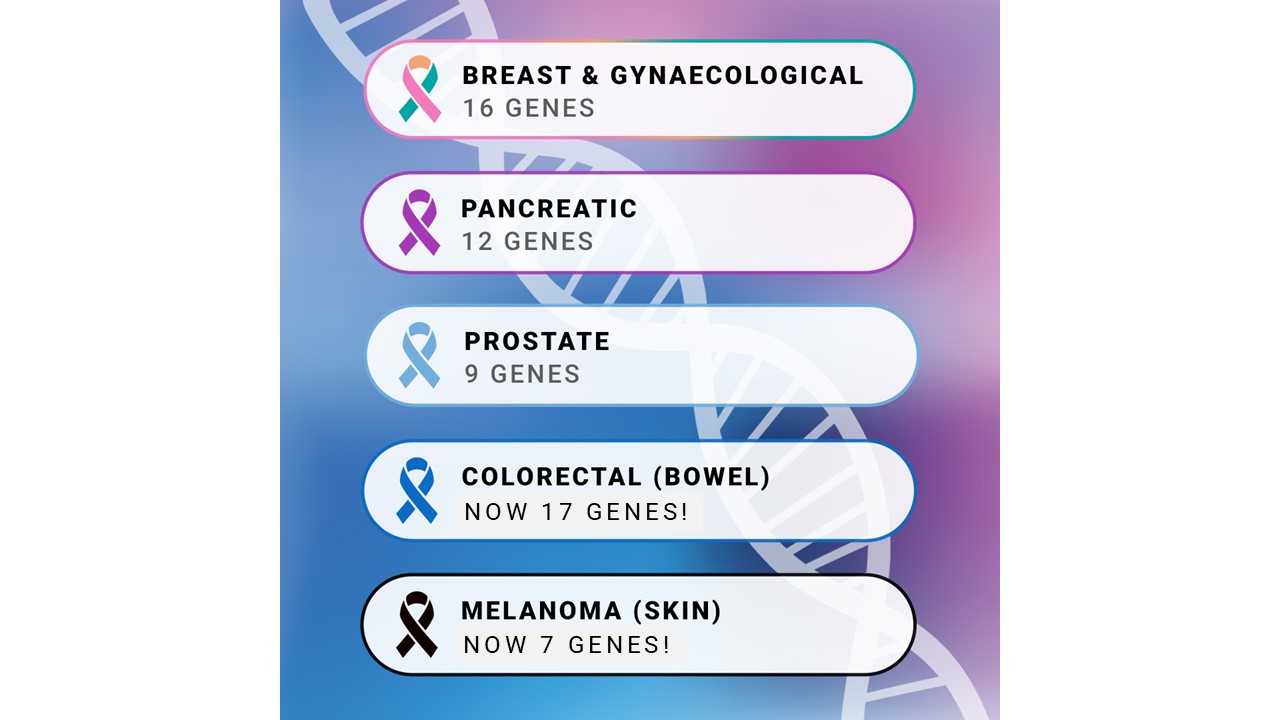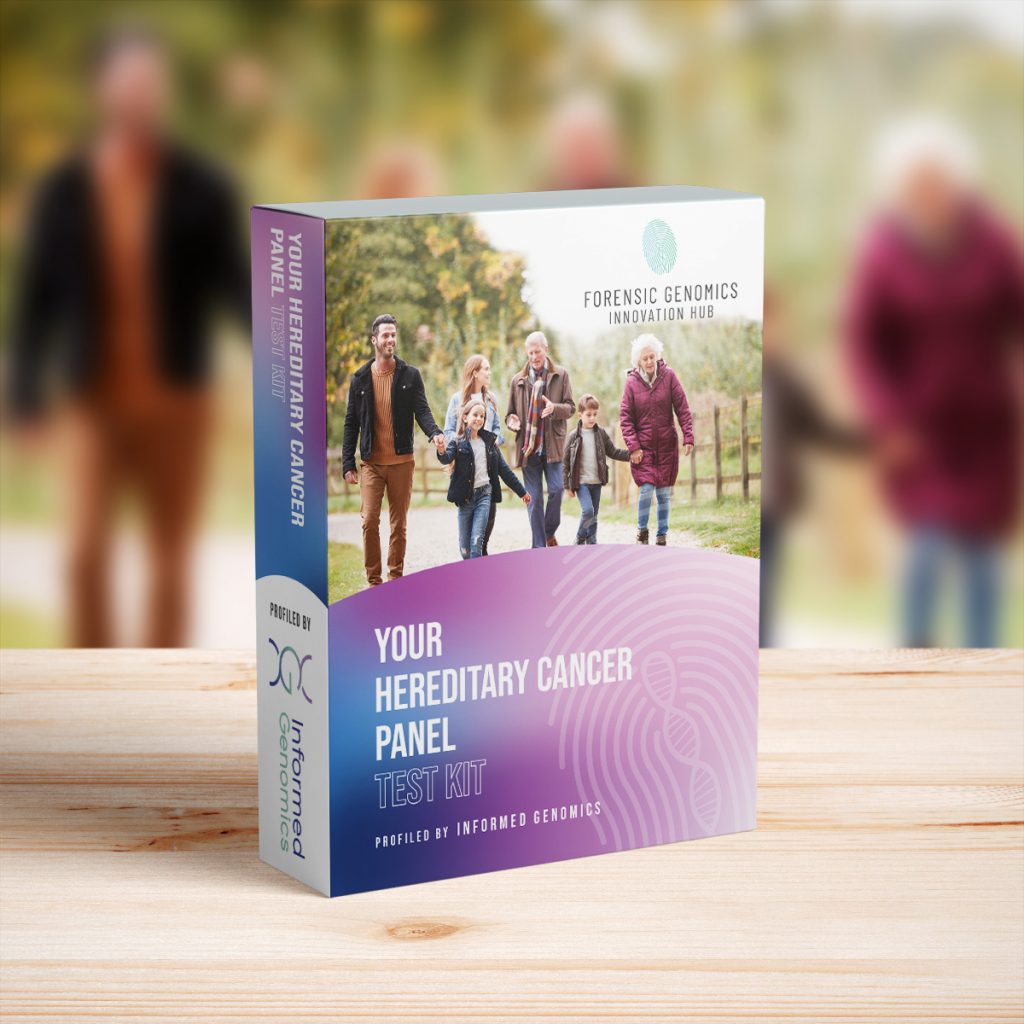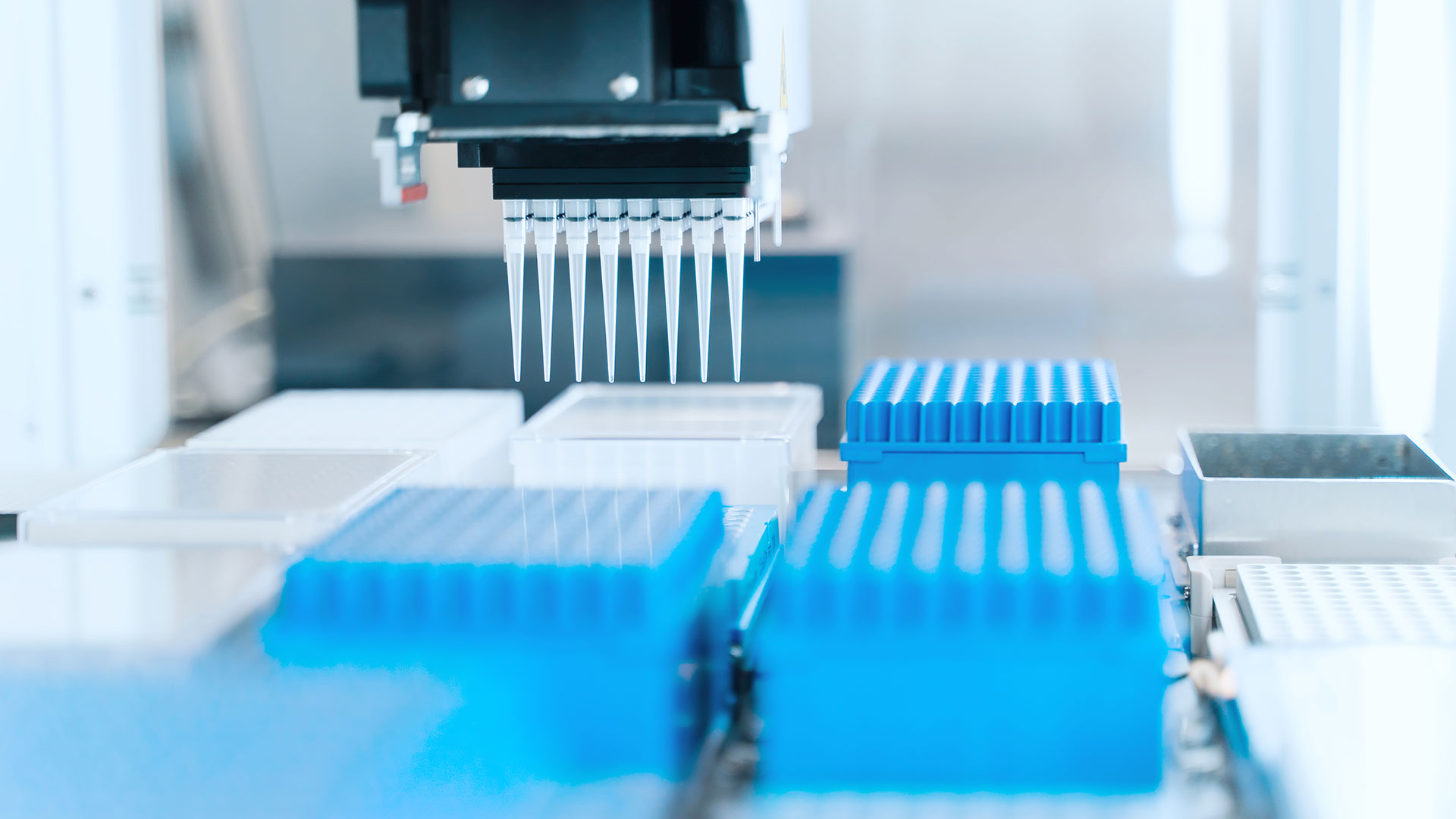What is cancer?
Cancer is uncontrolled cell growth in an area of the body. When uncontrolled cell growth happens, it can form a tumour. Cancerous tumours can spread to other tissues which can affect how the body functions. Cancer is caused by variants in genes which normally control the growth and replication of cells. For more information please see Cancer Research UK.
What is hereditary cancer?
A type of inherited disorder in which there is a higher-than-normal risk of certain types of cancer. Hereditary cancer syndromes are caused by mutations (changes) in certain genes passed from parents to children. In a hereditary cancer syndrome, certain patterns of cancer may be seen within families.
Can I get tested if I have cancer?
Yes. The test is available to all adults over the age of 18 regardless of any known health conditions and family history. Many people get tested when they have been diagnosed with cancer to find out if they have an inherited susceptibility gene which could have resulted in the cancer developing. This information can then be used to inform other family members.
Which hereditary cancers do you cover?
We offer a range of testing kits to study genes associated with the most common hereditary cancers ranging from a comprehensive multi-cancer testing kit to targeted kits for breast, ovarian, colorectal, prostate, melanoma and pancreatic cancer.
Which genes are covered in the tests?
The genes covered in each hereditary cancer testing kit are included in the Comprehensive Panel list. All genes have been expertly curated and have known clinical associations with increased cancer risk.
How were the genes selected?
The genes selected in the Informed Genomics hereditary cancer testing kits have been expertly chosen using scientific and medical literature and have been developed in accordance with national testing guidelines. All genetic variants reported will be clinically actionable and allow for informed decisions regarding risk management programmes.
Are the Ashkenazi Jewish common founder mutations associated with hereditary breast and ovarian cancer covered?
Yes the BRCA 1 185delAG (c.68_69delAG), BRCA1 5382insC (c.5266dupC), and BRCA2 6174delT (c.5946delT) gene mutations can be detected by the Comprehensive Hereditary cancer panel, the hereditary breast cancer panel, the hereditary breast and gynaecological cancer panel (and the hereditary prostate cancer panel and the hereditary pancreatic cancer panel).
Why are the targeted panels the same price as the comprehensive panel?
Because of the nature of the technology the targeted panels go through the same workflow as the comprehensive panel. The cost to process your sample is therefore the same for all panels, but only the selected hereditary cancer genes are reported back to you. It is a personal preference as to whether you would like all the genes reported, or just those associated with the hereditary cancer of interest to you.
What is Next Generation Sequencing?
Next Generation Sequencing (NGS) is a large-scale, high-throughput technology that allows the order of nucleotide bases within a genome to be studied. NGS alongside bioinformatic analysis is widely used in both the medical healthcare industry as well as within clinical research to investigate different health conditions including cancer.
How are my results analysed and interpreted?
The team of HCPC registered clinical scientists at Informed Genomics will interpret your test results in accordance to well recognised best practice guidelines and provide you with a thorough report of your results.
What will happen to my results?
Your results will be interpreted by our team of expert clinical scientists and the results will be returned securely either to yourself or to your healthcare provider dependent on your healthcare providers preferred method of return. All results are treated as fully confidential, and we will not share any personal details or test results with any third parties without your consent. Your result may become part of your record with your healthcare provider.
What will happen to my sample after testing?
After completion of the testing process, the sample will be stored. Please refer to the consent information for further information regarding storage of DNA and data.
What happens if my tube breaks or I need a replacement tube?
Please contact the laboratory via lab@fgih.co.uk to request a repeat tube or for any further questions regarding sampling.
What do the results mean?
Detection of a pathogenic or likely pathogenic variant means that a variant has been found in a gene that increases the risk of you developing a particular cancer, but this does not mean that cancer will definitely occur. Genetic variants can occur naturally as we get older, and they are also influenced by both environmental and lifestyle factors.
Hereditary cancer susceptibility is linked to genes known as tumour suppressor genes. Our DNA contains two copies of these genes. A single functional copy of the gene is sufficient at preventing cancer from developing; however, by having a pre-existing variant in a tumour suppressor gene, the risk of both copies being inactivated through a random second fault is increased. In essence, cancer has been given a head start and if the body is found to have these inherited genetic mutations, then your chances of developing certain types of cancers are higher compared to a person who does not have these genetic variations.
If no clinically relevant variant is detected, this means that we have not found any evidence of a genetic variant that is linked to cancer susceptibility. This lowers the risk of a genetic predisposition to cancer but does not exclude it. Variants can exist in genes not covered by the hereditary cancer panel, as well as in genomic regions that fall outside of the scope of testing, such as deep intronic variants or promoter regions, but these are less common and evidence around their involvement is constantly being reviewed.
Participation in national screening programmes remains important, as well as adopting a healthy lifestyle, as the majority of cancers are sporadic.
How do we Interpret genetic variants?
Genetic variants are interpreted using the following methods: Interpretation based on ACMG (American College of Medical Genetics), ACGS (Association for Clinical Genomics Science) and CanVar-UK (Cancer Predisposition Gene Variant Database) specifications.
Using evidence-based criteria variants are described as pathogenic (disease causing), likely pathogenic, variants of unknown significance, likely benign and benign.
We standardise our interpretation using the latest clinical decision support software providing our HCPC registered scientists with the latest evidence and database resources for determining the pathogenicity of variants.
What are variants of unknown significance (VUS)?
Variants of unknown significance are variants where there is either insufficient evidence to support whether they are pathogenic or benign, or the evidence is conflicting. As these variants cannot be acted on, they are not reported. As our understanding is constantly evolving due to continued research in this field, VUS can change classification. However, if, over time, there is sufficient new evidence to support the reclassification of a VUS to pathogenic, a new report will be issued.
What do I do if a variant is found that could increase my risk of developing one of these particular cancers?
As the report is issued from an ISO15189 Accredited facility and analysed and reviewed by skilled, appropriately trained HCPC registered clinical scientists you can take your report to your GP to seek further advise on what screening programmes are available. Initial genetic counselling will be provided by our partner laboratory and they will discuss your results with you.








